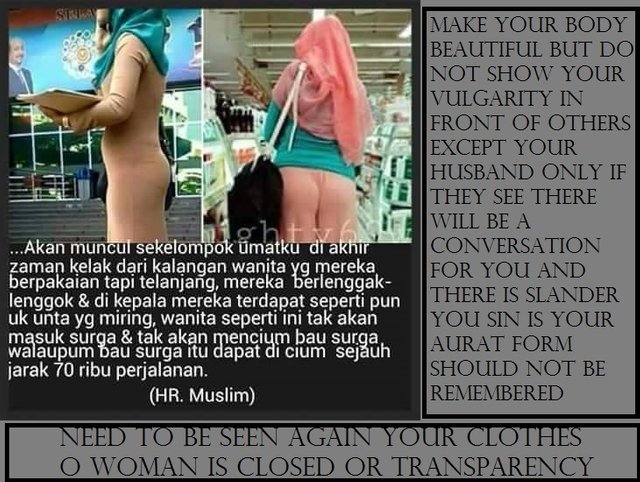need to be seen again your clothes o Woman Is closed or transparency
need to be seen again your clothes o Woman Is closed or transparency
make your body beautiful but do not show your vulgarity in front of others except your husband only if they see there will be a conversation for you and there is slander you sin is your aurat form should not be remembered
the hadiths say our prophet will appear my people at the end of the age later from the women they are dressed but they are naked they are swing their heads sloped like a camel's sloping slant woman who like this does not go to heaven and do not smell heaven along 70 thousand journey HR "Muslim" therefore keep your aurat oh woman cover the beauty of your body
I write and I'm sure when I write it
My hands are gone, but my handwriting is immortal
When my hand writes goodness, it's rewarded
If my hand writes badness, just waiting for a reply.
Narrated by Al-Bukhari in the book of Sahih hadith no. 6474 from Sahl bin Sa'id that the Messenger of Allah said.
"Whoever can give me guarantees (to guard) what is between his two beards and his two legs, then I give him the guarantee of entering heaven"
What is meant by what is between his two beards is the mouth, while what lies between his legs is the genitals.
Al-Bukhari in the book of Saheeh no. 6475 and Muslims in the book of Sahihnya no. 74 narrated the hadith from Abu Hurayrah that the Messenger of Allah said "Whoever believes in Allah and the Last Day should he say good or silent"
Imam Nawawi commented on this hadeeth when describing the hadiths of Arba'in. He explained, "Imam Shafi'i explained that the intent of this hadith is if one wants to say let him think first. If his word is not expected to bring mudharat, then please speak. However, if it is thought that his words will bring mudharat or doubt whether bringing harm or not, then he should not talk ". Some scholars say, "If you were the one who bought the paper for the angels who recorded your deeds, you would have been more silent than talking".
Imam Abu Hatim Ibn Hibban Al-Busti said in his book Raudhah Al-'Uqala wa Nazhah Al

mantap